
The Only 5 Keyword Research Tools You’ll Ever Need
One of the most fundamental parts of effective content marketing is solid keyword research. Keyword research allows you to bring the voice of your customer into your content marketing strategy. It also provides a measurable way to show the value of your content in a relatively short period of time. All digital marketing starts and ends with keyword research.
Keywords drive your content, because the higher you rank with keywords, the higher you are on Google’s search results. Seeing how your organic search rankings are performing is crucial to a healthy content marketing strategy.
Getting views on the content you publish for your website isn’t exactly the easiest thing to accomplish. It’s easy to throw money at paid advertising to up your impressions on your content marketing efforts, even if it does hurt to see a chunk of your marketing budget disappear.
But believe it or not, organic search rankings can help out your website traffic even more than paid advertising! Not to mention, it’s a cheaper way of going about marketing your site. Fueling the SEO machine is an important part of getting your content in front of your prospects’ eyes.
The distinction between promoted and organic is important, as they both accomplish different goals, but both are driven by good keyword research.
Quick Takeaways:
- Search engine optimization for your content and overall website is crucial to building your organic search rankings
- Keyword research is how you determine what’s being searched for in relation to your product or service
- Creating your content with SEO practices in mind will boost your overall engagements online
Here’s the only 5 keyword research tools you’ll ever need to nail your SEO strategy and how to use them long-term:
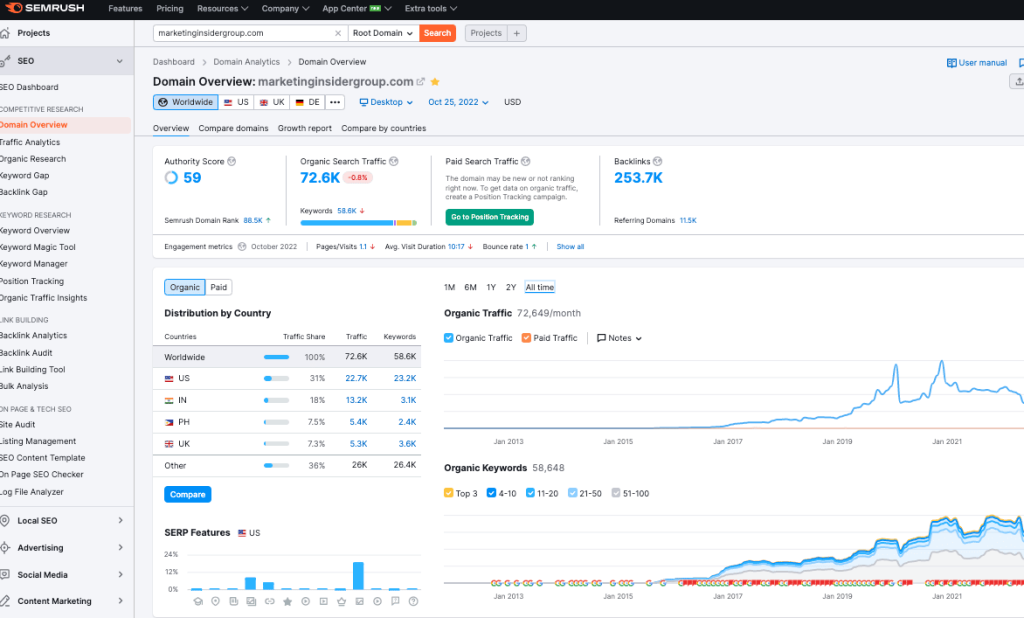
This is the main keyword research tool we use for ourselves and all of our clients (not a paid endorsement). Semrush allows us to research our client, their competition, run competitive gaps, dive deep into keyword research. It also allows for research into paid keywords, site audits, and more.
Once we identify our client’s focus keywords, we send them off to our editorial team to brainstorm content ideas and actual article headlines. We also upload them into Semrush to create a client Visibility Tracking Report. These reports are sent monthly to all of our clients showing them:
- Average visibility in search for all the keywords we are tracking
- An estimate of their organic search traffic (take this with some measure of caution)
- Average rank position
- How many keywords they have in the top 3, top 10, top 20 and top 100 and how many have improved or declined
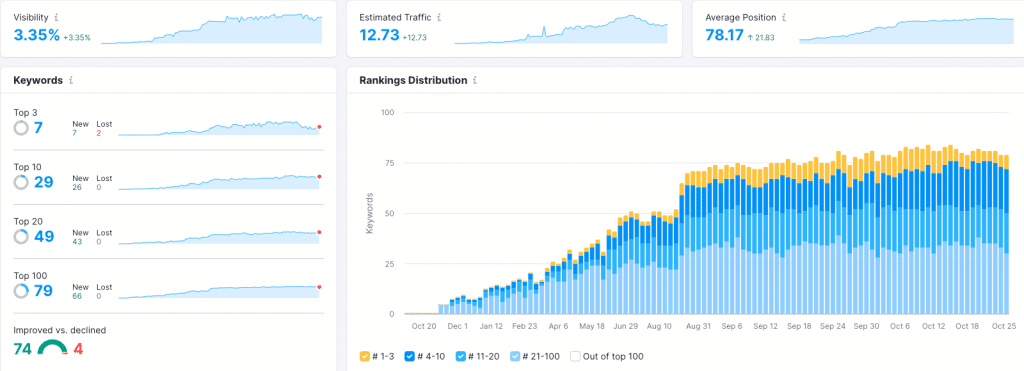
My favorite part of the report is the competitive review that shows client visibility vs the competition which is a direct reflection of the keyword research powering our content strategy:

Whether you’re interested in keyword and website research for you, your competition or your industry, Semrush is a powerful keyword research tool.
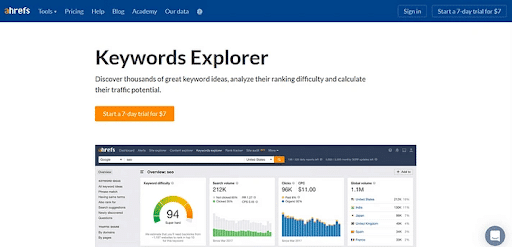
Ahrefs has provided excellent service for marketers and SEO specialists all over the world for over a decade. They offer a good trial plan and fantastic keyword research analysis on the top performing articles and websites.
Additionally, they offer a free service for website owners called Webmaster Tools, and my favorite is their free Keyword Generator which provides 150 keyword ideas from any main keyword.
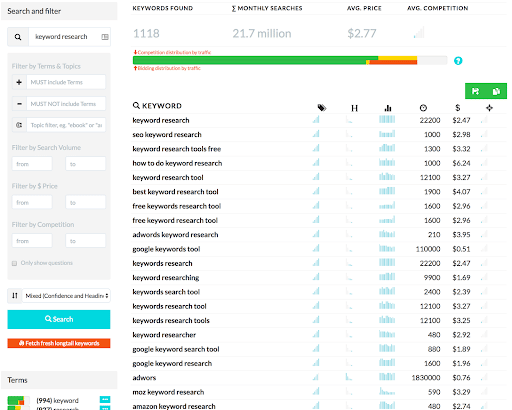
Keyword.io boasts a 99.9% success rate for its free keyword research service. So free in fact, that you don’t even need an account to use its comprehensive database. As per their site:
Keyword Tool helps you employ Google Suggest for keyword research. It extracts Google keyword suggestions and presents it to you in an easy-to-understand interface.
- Google Keyword Finder
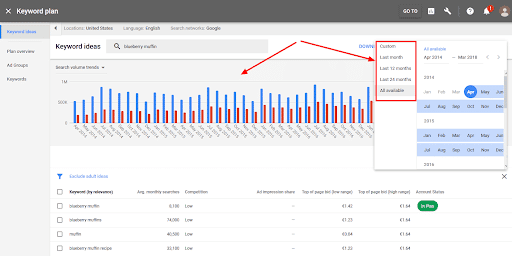
Surely you might’ve guessed we’d get right to one of the biggest sources of keyword research in Google’s keyword finder. Google is the dominant force in the keyword research industry, as sooner or later your content will be on their browser search results.
While it isn’t as intuitive as some of the other tools, it is free and has all of the data you need to see to make good decisions in your SEO practices.
Moz is the first keyword research tool I ever used. It’s great for analyzing your website and specific keywords as well. Moz can help you understand how people are finding your website and how to make the most of keyword opportunities.
Some other Keyword Research Tools to Consider
- Google Trends provides not just the relative volume of multiple keywords but also the trend data so you can see what is hot and what is not
- QuestionDB uses related queries and reddit for identifying question-based keywords
- Jaaxy provides keywords, topic and idea suggestions for any keyword or website
- Keyword Sheeter uses Google autofill to populate thousands of ideas from any focus keyword you enter
- Answer the Public also uses Google autofill and “People Also Ask” to populate search phrases with all the who, what, why, when, and how version of any search query
- Keyworddit pulls data from reddit and offers an interesting take on topics to explore for any keyword
- Bulk Keyword Generator is a good research tool for local SEO
- Soovle uses search data from google, youtube and Amazon
- SECockpit is the tool SEO experts swear by because it provides lots of depth
- Keyword Snatcher provides up to 2,000 keyword suggestions for any “seed” keyword (as the SEOs call them)
- KWFinder allows you to search by keyword difficulty
- Serpstat is another tool that allows you to go deep and is beloved by many SEO experts
New to keyword research?
We start by asking our clients for a few simple things:
- 5-10 keywords they wished they ranked for
- The categories, themes or topics they think are important in their industry
- Their top 4-5 competitors
- 2-4 industry or trade publication their audience reads
From there, we are able to expand the keyword list. We group those keywords into structured categories or themes. Then we identify the most important or “focus” keywords by looking at whether they are long-tail, or short-tail, have clear buyer intent, and if they represent an opportunity based on a competitive gap.
My favorite trick is use CPC data to identify those keywords other people are spending money against. The assumption here is that people wouldn’t pay more to advertise against a keyword unless it had lots of value.
BONUS: Check out this and more of my keyword research tips and tools in my latest webinar 10 tips for optimizing your content marketing.
If you’re looking for more of a basic training on keyword research check out this video:
Conversion rates from your keyword research
Views are great, but what happens after the initial click? Is the reader just leafing through your website? Are they sharing it? Are they actually purchasing your product or scheduling your services?
Conversion rate shows how many prospects are becoming customers. This metric is the real shining gem of your content marketing efforts! Converting prospects should be your number one goal with content marketing.
Oftentimes the places where you are producing and publishing media give you excellent analytics tools to help assess what ads or content is producing the best conversion rate.
By figuring out what content does the best across what platforms, you can make better, more informed decisions on what media to spend the most time on.
Retaining your conversions as long-term customers
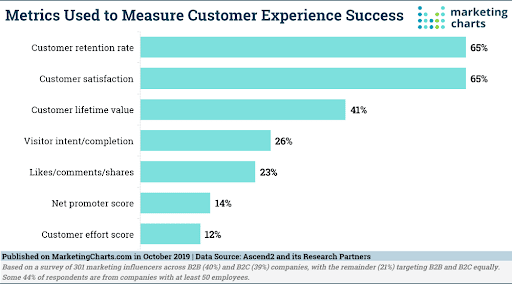
Source: Marketing Charts
Customer Retention is the measure of the percentage of customers who continue to use your product over time (you know, the ones you just pulled with good keyword research!). Some companies measure the opposite of retention: churn rate. Or the percentage of customers who leave in a given time period.
Ultimately, the only way a company can be successful is if the cost to acquire and retain a customer is largely outweighed by the monetization that customer will return to your business (about 3-5x that cost).
So how do you know if you’re retaining customers acquired through your digital media efforts? There’s a few ways!
Analytics – Often websites will show you on the backend how many customers you have are repeat customers. Diving deep into the extra layer to see how many came from your digital media efforts is a good step in hitting your KPIs.
You can ask – Using surveys through your email marketing efforts can help you figure out just who has been using your product or service over a longer period of time. This also builds brand trust because people want to feel like your business cares about them.
Look at the voices on your social media channels – Seeing individual voices in your business’ community discuss your business, service, or content can give you a good read on how many newer customers you are attracting and if there are any older clients steering the overall conversation online.
Wrap Up
Whichever site you use, keyword research is a necessity for creating reliable search traffic for your business. Without keeping good SEO practices in mind in your writing and meta description, you’re throwing away easy traffic that makes you money.
You have the knowhow, it’s time to hop on board with one of these keyword research tools and see which is right for you!
Do you want to use some of the marketing strategies seen here on MIG’s site but need some help or advice? Marketing Insider Group has a team of 35+ experienced writers ready to produce content for YOUR business. Check out our weekly blog content service or schedule a free consultation.






